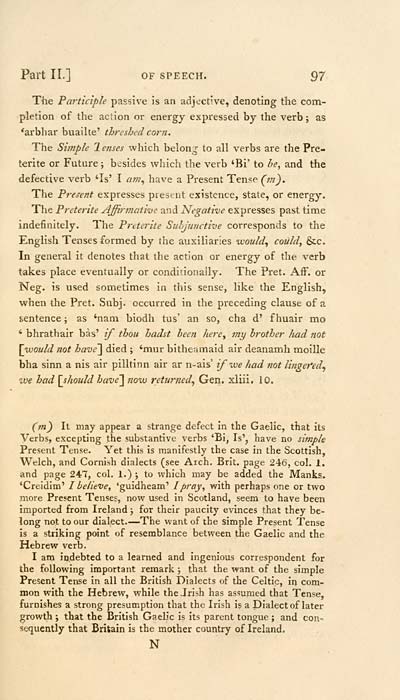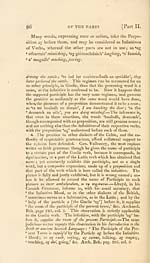Download files
Complete book:
Individual page:
Thumbnail gallery: Grid view | List view

Part II.] OF SPEECH. 97
The Participle passive is an adjective, denoting the com-
pletion of the action or energy expressed by the verb; as
'arbhar buailte' threshed corn.
The Simple 1 ejises which belong to all verbs are the Pre-
terite or Future ; besides which the verb *Bi' to he, and the
defective verb 'Is' I am, have a Present Tense (m).
The Present expresses present existence, state, or energy.
The Preterite Affirmative and Negative expresses past time
indefinitely. The Preterite Siihjtmctive corresponds to the
English Tenses formed by the auxiliaries 'would, could, &c.
In general it denotes that the action or energy of the verb
takes place eventually or conditionally. The Pret. AfF. or
Neg. is used sometimes in this sense, like the English,
when the Pret. Subj. occurred in the preceding clause of a
s,entence ; as 'nam biodh tus' an so, cha d' f huair mo
' bhrathair bàs' if thou hadst been here, my brother /lad not
[zvould not have"] died ; 'mur bitheamaid air deanamh moille
bha sinn a nis air pilltinn air ar n-ais' tyzue had not lingered^
we had \should have'\ now returned, Gen. xliii, 10.
(m) It may appear a strange defect in the Gaelic, that its
Verbs, excepting the substantive verbs 'Bi, Is', have no simple
Present Tense. Yet this is manifestly the case in the Scottish,
Welch, and Cornish dialects (see Arch. Brit, page 246, col. 1.
and page 247, col. 1.) j to which may be added the Manks.
'Creidim' I believe, 'guidheam' I pray, with perhaps one or two
more Present Tenses, now used in Scotland, seem to have been
imported from Ireland j for their paucity evinces that they be-
long not to our dialect. — The want of the simple Present Tense
is a striking point of resemblance between the Gaelic and the
Hebrew verb.
I am indebted to a learned and ingenious correspondent for
the following important remark ; that the want of the simple
Present Tense in all the British Dialects of the Celtic, in com-
mon with the Hebrew, while the Jrish has assumed that Tense,
furnishes a strong presumption that the Irish is a Dialect of later
growth ; that the British Gaelic is its parent tongue ; and con-
sequently that Britain is the mother country of Ireland,
N
The Participle passive is an adjective, denoting the com-
pletion of the action or energy expressed by the verb; as
'arbhar buailte' threshed corn.
The Simple 1 ejises which belong to all verbs are the Pre-
terite or Future ; besides which the verb *Bi' to he, and the
defective verb 'Is' I am, have a Present Tense (m).
The Present expresses present existence, state, or energy.
The Preterite Affirmative and Negative expresses past time
indefinitely. The Preterite Siihjtmctive corresponds to the
English Tenses formed by the auxiliaries 'would, could, &c.
In general it denotes that the action or energy of the verb
takes place eventually or conditionally. The Pret. AfF. or
Neg. is used sometimes in this sense, like the English,
when the Pret. Subj. occurred in the preceding clause of a
s,entence ; as 'nam biodh tus' an so, cha d' f huair mo
' bhrathair bàs' if thou hadst been here, my brother /lad not
[zvould not have"] died ; 'mur bitheamaid air deanamh moille
bha sinn a nis air pilltinn air ar n-ais' tyzue had not lingered^
we had \should have'\ now returned, Gen. xliii, 10.
(m) It may appear a strange defect in the Gaelic, that its
Verbs, excepting the substantive verbs 'Bi, Is', have no simple
Present Tense. Yet this is manifestly the case in the Scottish,
Welch, and Cornish dialects (see Arch. Brit, page 246, col. 1.
and page 247, col. 1.) j to which may be added the Manks.
'Creidim' I believe, 'guidheam' I pray, with perhaps one or two
more Present Tenses, now used in Scotland, seem to have been
imported from Ireland j for their paucity evinces that they be-
long not to our dialect. — The want of the simple Present Tense
is a striking point of resemblance between the Gaelic and the
Hebrew verb.
I am indebted to a learned and ingenious correspondent for
the following important remark ; that the want of the simple
Present Tense in all the British Dialects of the Celtic, in com-
mon with the Hebrew, while the Jrish has assumed that Tense,
furnishes a strong presumption that the Irish is a Dialect of later
growth ; that the British Gaelic is its parent tongue ; and con-
sequently that Britain is the mother country of Ireland,
N
Set display mode to: Large image | Transcription
Images and transcriptions on this page, including medium image downloads, may be used under the Creative Commons Attribution 4.0 International Licence unless otherwise stated. ![]()
| Early Gaelic Book Collections > Blair Collection > Elements of Gaelic grammar > (127) |
|---|
| Permanent URL | https://digital.nls.uk/79041499 |
|---|
| Description | A selection of books from a collection of more than 500 titles, mostly on religious and literary topics. Also includes some material dealing with other Celtic languages and societies. Collection created towards the end of the 19th century by Lady Evelyn Stewart Murray. |
|---|
| Description | Selected items from five 'Special and Named Printed Collections'. Includes books in Gaelic and other Celtic languages, works about the Gaels, their languages, literature, culture and history. |
|---|

